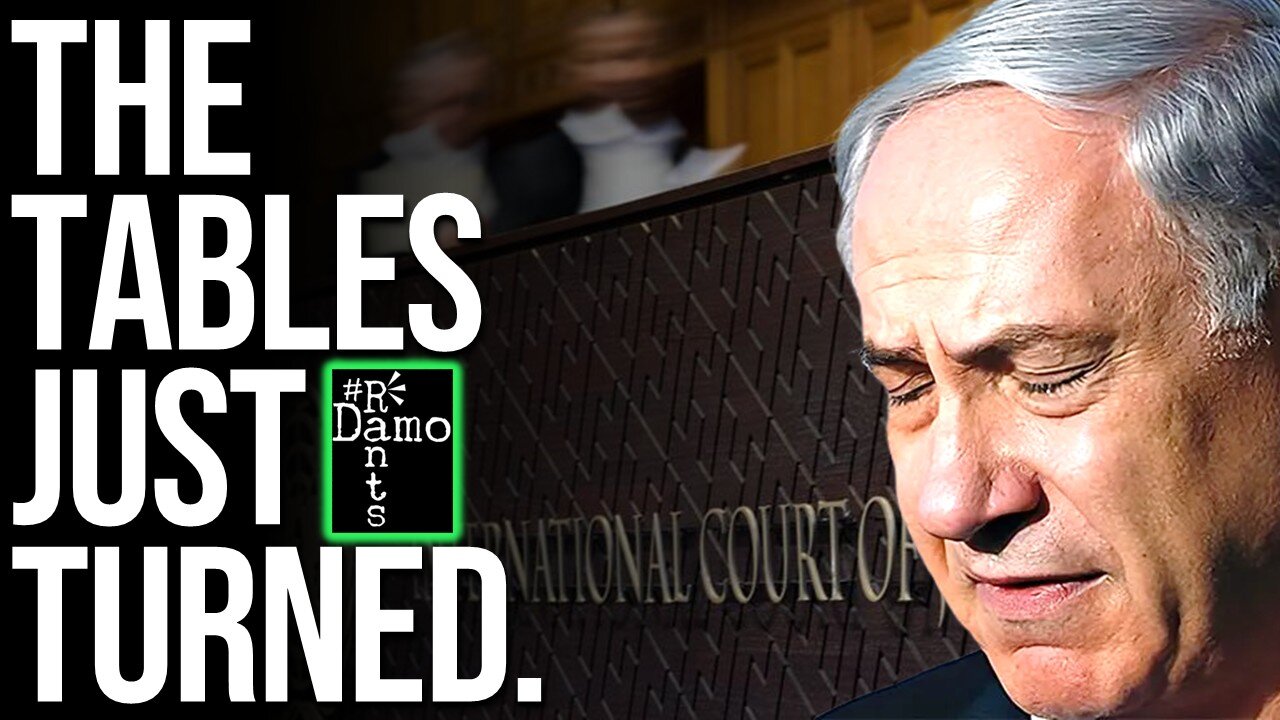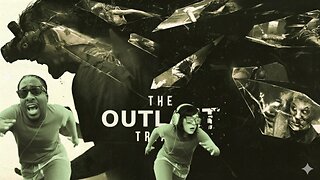Premium Only Content

ICJ Delivers Its Most Devastating Blow to Israel Yet – Here’s Why
Right, so Israel just got the kind of judgment you can’t spin, veto, or blow away. The International Court of Justice has ruled that its blockade of Gaza isn’t a “security measure” — it’s a breach of humanitarian law, a textbook violation of the duties every occupying power signs up to. In one afternoon, the world’s top judges dismantled two decades of excuses: no, Gaza isn’t “self-governing,” and no, UNRWA isn’t a front for Hamas. Even the courtroom decorum couldn’t hide the scale of the spanking Israel got delivered to it, destroyed on every single count. Within hours, Israel of course vowed to ignore the decision, confirming exactly why it was issued. This wasn’t a war crimes charge this time — it was worse, far worse: a formal declaration that Israel has stepped outside the law it claims to live by and by declaring they are ignoring the ruling, they have now officially declared themselves to be a rogue state.
Right, so yesterday the International Court of Justice issued a judgment that ended decades of ambiguity on Israel’s part.
In a packed courtroom in The Hague, ICJ President Yuji Iwasawa read the opinion aloud. Israel, as the occupying Power, must ensure the provision of food, water, fuel, and medical care to civilians in Gaza and must allow UN agencies, including UNRWA, to operate freely.
That line changed everything. It confirmed that the Gaza Strip remains under Israeli occupation and that the siege imposed since 2023 violates the Fourth Geneva Convention. The Court ruled that starvation of civilians is illegal under any circumstance and that Israel’s two-year blockade, combined with the ban on UNRWA, constitutes a breach of international humanitarian law.
The Court also dismissed the centrepiece of Israel’s public defence: the claim that UNRWA staff were infiltrated by Hamas. The judges found no credible evidence for it whatsoever. Israel lied through its teeth, well colour me surprised; but the court was having none of it.
By rooting its language in treaty clauses rather than politics, the ICJ left no escape route. Gaza’s deprivation was not “unintended hardship”; it was the result of Israeli policy.
More than two thousand Palestinians had already died near aid-distribution points between March and May of this year while convoys were blocked, the legacy of the risibly called Gaza Humanitarian Foundation. Three hundred and sixty UN staff were killed in the same period. These numbers were drawn from UN and ICRC field data already on record. The ruling therefore reflected fact, not sentiment.
The advisory opinion runs over a hundred pages, as these things tend to do, but its conclusions fit on one.
Israel is the occupying power.
It has failed to meet its humanitarian obligations.
Its blockade and restrictions violate Articles 55 and 56 of the Fourth Geneva Convention.
Its use of starvation breaches Article 54 of Additional Protocol I.
Its allegations against UNRWA lack evidence.
Forty states and international organisations presented submissions. Only two — the United States and Hungary — opposed the prevailing view. That near-unanimity makes the ruling the most isolating legal defeat Israel has ever faced.
The decision also activates another body of law: Articles 40 and 41 of the Articles on State Responsibility. Other governments now have a duty not to recognise or assist an unlawful situation and to cooperate to end it. The legal burden has shifted outward; complicity now carries its own liability. For those states insisting on assisting Israel, the legal consequences for them just got a lot bigger.
This is why the ruling cuts deeper than the 2004 Wall Opinion or the 2024 genocide-prevention order off the back of South Africa’s case, which is the one many of us might consider the most significant. Those earlier cases defined principles. This one establishes evidence. It names the blockade, counts the dead, and identifies obstruction as a deliberate act. The paper trail becomes a legal fuse.
Within hours though, an Israeli official told KAN News that “UNRWA will no longer set foot in Gaza.”
It was an open declaration of non-compliance, baby spitting the dummy again, cue the toddler tantrums, all made on national television. The same official repeated the discredited claim that UN agencies were controlled by Hamas and said Washington had been notified.
That single quote converted a legal defeat into a diplomatic crisis. Israel had not only lost the case; it had chosen to defy the verdict. In law that matters. Non-compliance extends the breach and invites counter-measures by other states. In politics it forces allies to decide whether they will join Israel in violating international law.
Norway had initiated the request for this opinion back in 2023. Hours after the judgment, Foreign Minister Espen Barth Eide announced that Oslo would take it to the UN General Assembly.
The draft resolution now circulating in New York demands that Israel lift its restrictions, restore UNRWA’s mandate, and permit full humanitarian access. It also instructs the UN Secretary-General to report within 60 days on compliance.
If the Security Council blocks enforcement, if – of course the US will veto it - the General Assembly can invoke its Uniting for Peace procedure, used in the Suez Crisis of 1956 and again against apartheid South Africa, though of course UN Secretary-General Antonio Guterres has been avoiding this measure like the plague it seems. Under that mechanism however no state has a veto. A vote showing 140 countries in favour and a handful opposed would formalise Israel’s isolation in international law. The UN needs to grow a spine at last.
The impact of this judgement however unfolds in layers. It has layers like onions and ogres apparently.
First, it erases the “disengagement” myth. Israel’s 2005 withdrawal from settlements did not end control of Gaza’s airspace, sea access, and borders. The Court’s confirmation of continuing occupation means every act inside the Strip falls under occupation law.
Second, it invalidates Israel’s attempt to substitute a national “Gaza Humanitarian Foundation” for UN operations. The Court found that body inadequate and unlawful, removing any claim that Israel could self-certify compliance.
Third, it vindicates UNRWA. Donor states that froze funding on the basis of Israeli allegations must now acknowledge that the allegations were unproven. Their suspension decisions themselves become part of the legal problem.
Fourth, it internationalises responsibility. Other states are legally obliged to avoid enabling the blockade. That requirement feeds directly into export-control law in Europe, North America and Australia.
Finally, it isolates Israel’s chief protector. With only the United States and Hungary defending its position, Washington now carries the entire reputational weight of defending an indefensible act. That will come crashing down on Trump’s shoulders harder than the East Wing of the White House.
The ICJ’s analysis rests on field data, not rhetoric. The United Nations and the ICRC recorded that calorie availability per person in Gaza fell far below emergency thresholds. Hospitals reported deaths from dehydration and untreated infection. These are the objective indicators by which humanitarian lawyers identify starvation as a weapon.
By citing them directly, the Court converted a moral accusation into a legal classification. “Humanitarian crisis” is a journalistic phrase. “Starvation as a method of warfare” is a crime. The distinction is the difference between empathy and evidence.
Israel’s official line—security necessity—could not survive scrutiny either.
The Court documented that between March and May of this year a total blockade was in place and that the restriction of supplies was a policy decision, not a battlefield necessity. It recalled that UN premises and staff are protected under the 1946 Convention on the Privileges and Immunities of the United Nations and that this protection was breached.
Once these facts were entered into the record, the logic of “self-defence” collapsed. A state cannot claim security while withholding food from civilians it occupies. For donors, this finding also removes the fig-leaf of ambiguity: continuing to cut UNRWA funding, as some nations have, or made it conditional, now sustains an unlawful condition.
Only one judge dissented and for those familiar with the ICJ make-up to any particular degree I wonder if you can guess who it was? It was she who has openly stated that “The Lord is counting on me to stand on the side of Israel.” Uganda’s representative, even though they’ve distanced themselves from her as well, Judge Julia Sebutinde. The International Commission of Jurists has requested an investigation into her impartiality. The episode turned what could have been a unanimous routing for Israel, into her routine dissent and another example of her seemingly self-proclaimed bias. The result was nevertheless striking: fourteen judges from every region concurred on the law, and the sole dissenter undermined herself again.
Governments across the globe hailed the opinion as vindication. South Africa, Malaysia, Chile and Ireland declared support for Norway’s resolution. The Arab League called it a watershed. Western responses were cautious but telling: Washington called the decision “non-binding,” London promised to “study it,” and Brussels expressed “concern.” Yet legal departments within those governments must immediately begin reviewing arms licences and export-risk frameworks in light of how the law as applied to them, just got broader. Once a judgment of breach exists, ignoring it carries its own liability.
Banks and insurers noticed too. A country formally declared in violation of humanitarian law becomes a compliance hazard. Risk managers treat such rulings as triggers for review, raising borrowing costs and deterring investment. The market’s language for accountability is quiet but effective and for all of Israel’s throwing of the toys out of its pram, they now face another economic shock.
The pattern is familiar. In 1971 the ICJ ruled South Africa’s occupation of Namibia illegal. Western governments dismissed it. Fifteen years later that same opinion underpinned sanctions that helped end apartheid. Israel now occupies the same legal position: an international pariah whose immunity is eroding case by case.
Each act of defiance just adds weight to the record. Law is patient; it accumulates evidence until enforcement becomes a matter of timing, not argument.
Shortly after the verdict, more than 450 Jewish academics, writers and artists signed an open letter demanding sanctions. They accused Israel of war crimes and genocide, called for an arms embargo and asset freezes, and urged governments to distinguish between antisemitism and legitimate criticism and of course this intervention, their statement matters because it dismantles the constant Israeli reflex defence that opposition to Israeli policy is steeped in racism. Many in Jewish communities have been put n danger by Israeli conflation of Judaism and antisemitism, it is so important that as many members of the global Jewry keep on speaking out.
Norway’s draft resolution will reach the General Assembly before the end of they year. Once adopted, the Secretary-General must report within sixty days on Israel’s compliance. If non-compliance persists as I suspect most of us assume it will, an emergency special session under Uniting for Peace can recommend collective measures. Such recommendations are not binding but they do give political and legal cover for states to impose sanctions or suspend trade, so it’d be incumbent upon all of us as ordinary citizens to apply the pressure.
Simultaneously, the International Criminal Court, the ICC, can incorporate the ICJ’s factual findings into its ongoing investigation into crimes in the occupied territories. The Court in The Hague now holds both the factual and the legal record to proceed with after all.
The confrontation is no longer between Israel and UN agencies. It is between Israel and the international legal order. Article 94 of the UN Charter requires members to comply with ICJ decisions. Defiance therefore breaches the Charter itself. If this violation passes without consequence, the United Nations will have admitted that its highest court can be ignored by the powerful and obeyed only by the weak and the functional collapse of international law will basically be complete.
Legal accountability produces financial friction. Civil-society groups in Britain, Germany and Canada have filed or prepared court challenges arguing that continued arms exports now contravene domestic law. Parliaments have debated suspensions. Export regulators are reviewing licences. No embargo has been declared, but the bureaucratic tempo has changed. Decisions take longer. Risk assessments expand. That delay is the market’s translation of moral pressure.
The ICJ’s opinion strips Israel’s administration in Gaza of legal legitimacy. Under occupation law, authority depends on meeting humanitarian duties. Once those duties are violated, the administration becomes unlawful. Every further act—settlement expansion, border closure, airstrike on civilian infrastructure—extends the chain of illegality. The ruling freezes that status in the record. It will appear in every future case file and negotiation.
The initiative for this case came not from Washington or Brussels but from Pretoria, Kuala Lumpur and Oslo. The Global South drove the process and won. The geography of legal authority has changed. For decades Western governments claimed guardianship of international law, but this ruling demonstrates that its defence now rests with those who were once disproportionately marginalised by it.
For the United States and Europe their foreign policy rhetoric depends on the rule of law, yet they now shield a state found to be violating it. To ignore the ruling is to prove that “rules-based order” means selective obedience, yet many of us, especially when it comes to the Trump administration, will expect nothing else.
The thing with these ICJ rulings, is that each one we get – and this is now the third in relation to Israel and Gaza - becomes a foundation for the next. The 2004 Wall Opinion led to national court cases on settlement goods. The 2025 Gaza Opinion will underpin future sanctions and prosecutions. Law accumulates through documentation until politics catches up.
This ruling defines three things that can no longer be argued no matter how much Israel wails about it.
It defines starvation, blockade and obstruction of aid as illegal acts by a recognised state.
It defines UNRWA as an indispensable UN agency under protection of international law and innocent of Israeli accusation.
And it defines the obligations of all other states to end their material support for the blockade through ongoing support for Israel.
Definitions like these are permanent. They outlast governments.
The ICJ’s newest opinion is the most comprehensive judicial condemnation of Israeli policy since 1948. It records violations of humanitarian law, invalidates Israel’s excuses, and imposes obligations on every other government in relation to it. Israel’s immediate response—defiance—confirms the finding.
The issue now is enforcement. Whether the international community acts will determine if international law still functions as law or has been rendered meaningless as Israeli interests are prioritised over it. If the ruling is ignored, the promises of accountability and of ‘never again’ made after 1945 dies with it. If it is enforced, however slowly, it will mark the moment when the law finally outlasted Israel’s impunity.
So now question we’re left with is a very simple one: who will obey the Court, and who will join Israel in defying it?
Speaking of court cases though, this isn’t even the first massive legal blow to batter Israel this week, as a massive new 120 page dossier has been handed to the ICC now, which the ICJ ruling will now cast an even greater light over, already causing Israel to panic as it was to begin with, so get all the details of that story in this video recommendation here as your suggested next watch.
Please do also hit like, share and subscribe if you haven’t done so already so as to ensure you don’t miss out on all new daily content as well as spreading the word and helping to support the channel at the same time which is very much appreciated, holding power to account for ordinary working class people and I will hopefully catch you on the next vid. Cheers folks.
-
 LIVE
LIVE
SpartakusLIVE
7 hours ago#1 Solo Savant stream DEEP into the night || PUBG Later Tonight?!
701 watching -
 13:56
13:56
Clintonjaws
12 hours ago $0.10 earnedEntire Room Speechless As Poilievre Snaps & Puts TV Hosts In Their Place
35.6K13 -
 4:23:32
4:23:32
EricJohnPizzaArtist
1 day agoAwesome Sauce PIZZA ART LIVE Ep. #67: HALLOWEEN SPECIAL tribute to “Need to Breathe”
52.6K10 -
 2:26:26
2:26:26
Nerdrotic
8 hours ago $0.23 earned3I/Atlas : A Cosmic Horror or a New Interstellar Understanding? | Forbidden Frontier #122
200K17 -
 54:56
54:56
Sarah Westall
6 hours agoHidden Biblical Writings: Evidence Based Investigation, Worlds First Collection w/ Matthew McWhorter
26.6K18 -
 3:08:48
3:08:48
megimu32
5 hours agoOTS: Great Scott! How Back to the Future Changed Movies Forever
28.3K9 -
 3:40:15
3:40:15
CassaiyanGaming
4 hours ago🟢LIVE - The OUTLAST Trials with JahBless & CatDog
20.2K4 -
 10:54
10:54
Nate The Lawyer
2 days ago $0.67 earnedNEW Charges & Lawsuit For Fake Doctor Illegal Who Ran Schools For Decades
47.3K36 -
 2:34:44
2:34:44
Joker Effect
4 hours agoSTREAMER NEWS: Adin Ross, LupLupka, SideScrollers, N3on, TrainwrecksTv, Cuffem, WestCol, BottedWTF.
20.5K9 -
 3:04:40
3:04:40
IsaiahLCarter
1 day ago $0.19 earnedWill New York City Choose Communism? || APOSTATE RADIO 032 (with John D. Macari)
28.4K10